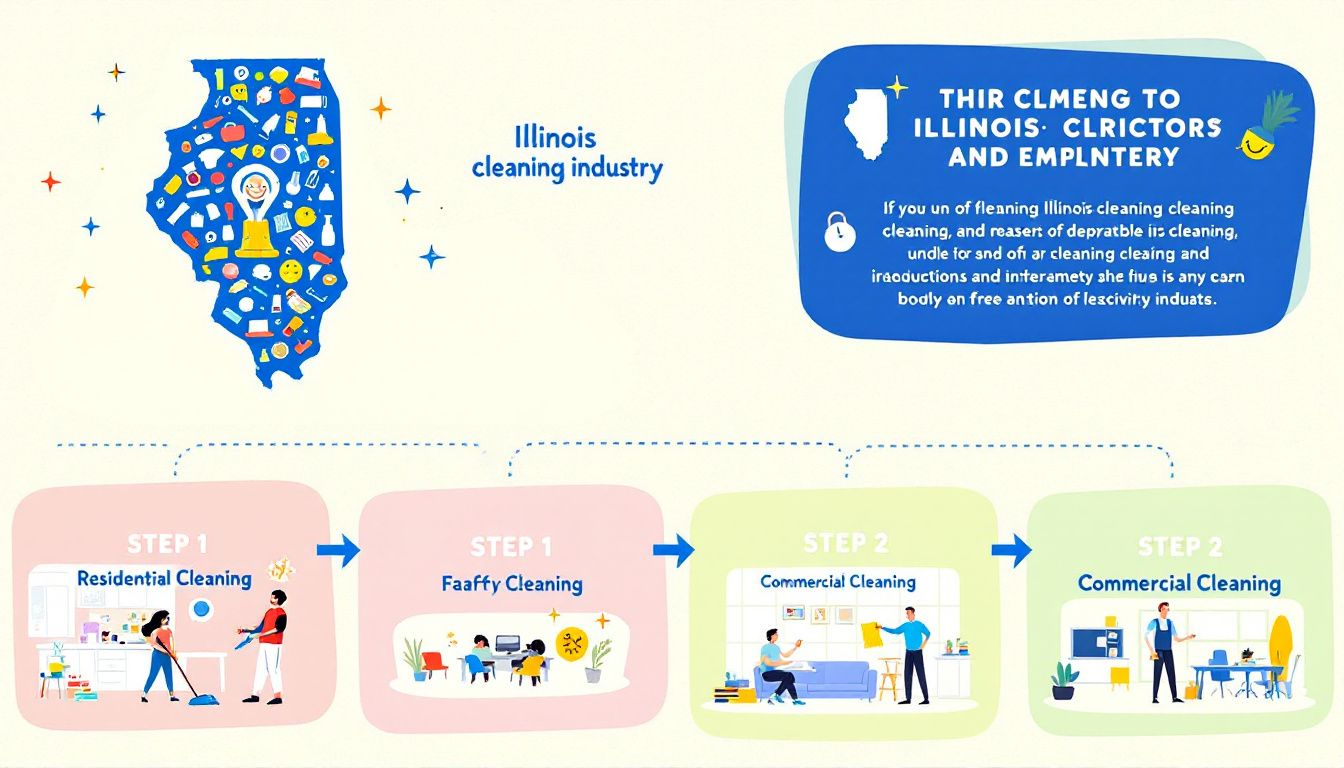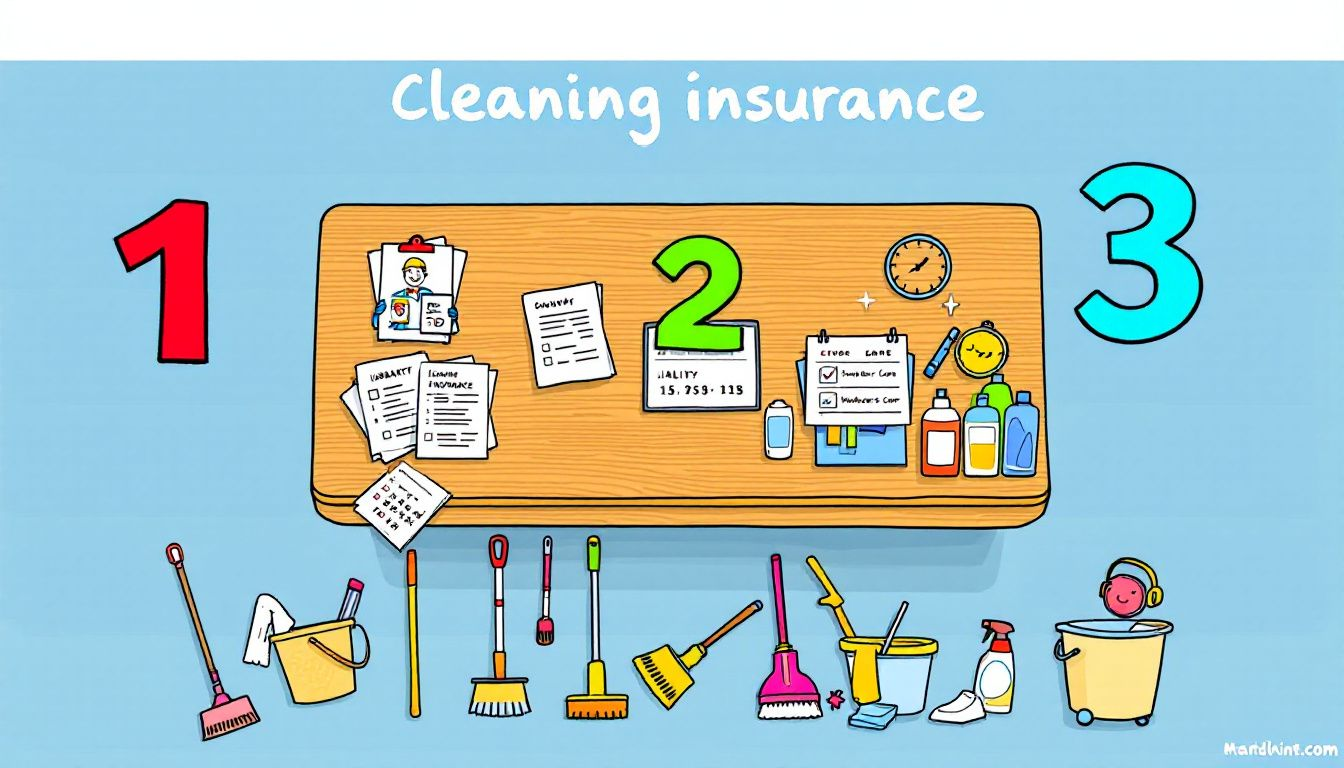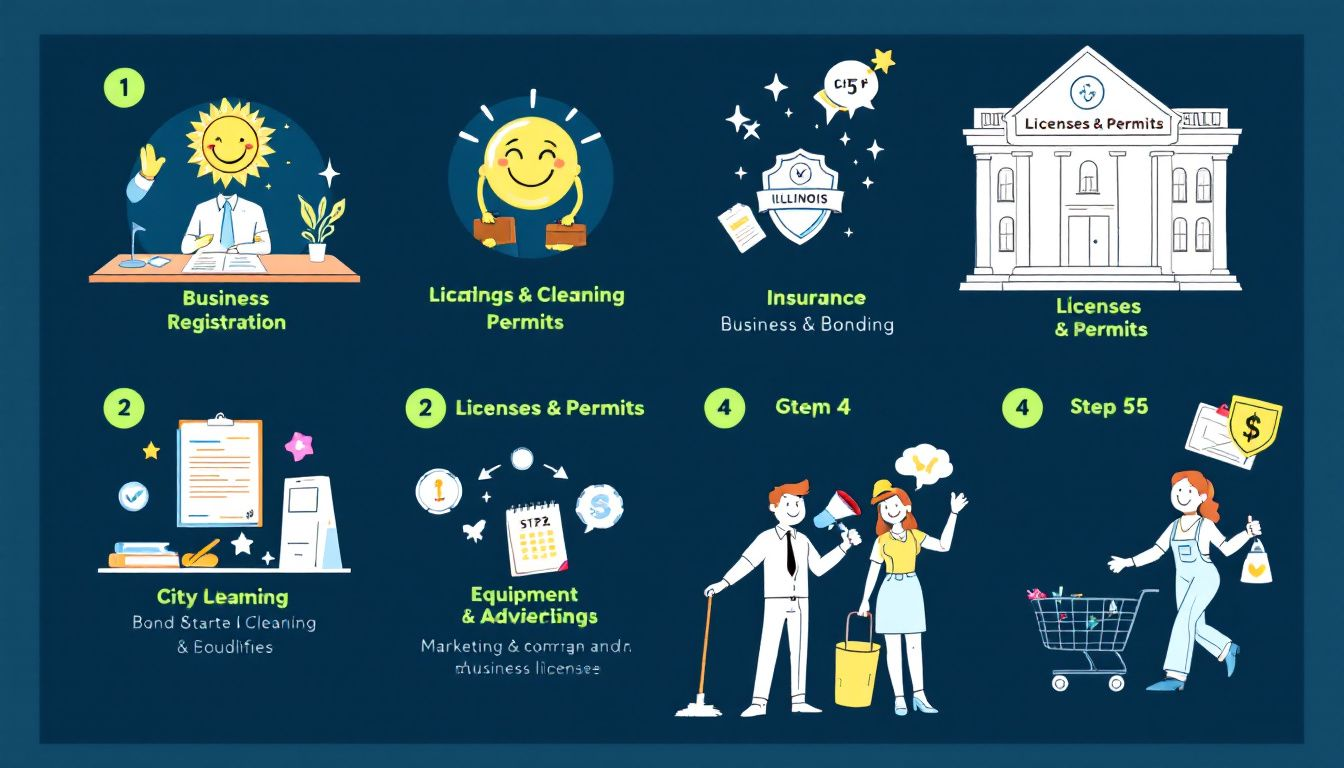Starting a cleaning business in Illinois is easy if you know how to start a cleaning business in Illinois. From local regulations to licenses, we’ll walk you through everything you need to get your cleaning service up and running.
Quick Facts
-
Illinois cleaning industry and environmental regulations are key to success.
-
Find a niche and tailor services through market research to stand out from the competition.
-
Business structure, licenses and insurance are key to legal operation and risk management.
Illinois Cleaning Industry

Understanding the cleaning industry in Illinois is crucial to starting a successful cleaning business. The state has its own environmental regulations imposed by organizations like the EPA that affect how businesses operate. These rules require all cleaning services to follow certain standards when it comes to using cleaning chemicals and disposing of waste.
The local weather in Illinois affects the demand in the cleaning industry. Seasonal changes dictate not only how often but what type of cleaning services are needed. For example, during winter months there may be an increase in full service cleanings due to snow and salt accumulation. In the spring there may be an surge in requests for deep or carpet cleaning.
With almost 1.65 million local businesses across America’s landscape that offer various forms of cleaning – half of which are commercial – it’s clear how important commercial ventures are in this crowded space. Deciding whether you’ll focus on cleaning living spaces or start a company that caters to commercial cleaning involves weighing these factors carefully if you want your venture into a commercial cleaning business to succeed long term.
Find Your Niche and Services
When starting a cleaning business, finding your niche and services is key. Budgeting for basic cleaning services including supplies and transportation is important to run an efficient cleaning service. There’s a growing market for specialized cleaning services projected to hit $20 billion by 2030 in the US. Knowing your target market allows you to tailor your services to stand out in the competition.
You have two main sectors to consider: residential and commercial cleaning. Within these sectors lie the opportunity to focus on specific areas. On types of dwellings or businesses – for example, apartments, single family homes or high end estates with residential cleaning. Offices, shops or factories with commercial cleaning. By offering unique services like green cleaning solutions or carpet sanitation, you can attract specific customer segments and improve quality of service and operational efficiency.
You
Do your market research – this means analyzing competitors’ pricing and services while finding gaps in your community’s market that you can fill. Having a solid business model based on great service can differentiate you from the competition. Starting with free introductory cleanings can also help you get clients and get testimonials – key to building a successful business based on service tailored to your local customers.
Register Your Business Name and Structure
Setting up your business structure and naming your cleaning business is key. Different structures – sole proprietorship, corporation or LLC have different registration requirements and tax and liability implications. Choosing an LLC can protect you from personal liability while a sole proprietorship is easy to set up and manage.
If you want to operate your cleaning business under a name other than your legal name you will need to register that name by obtaining what’s called a fictitious name or DBA certificate. This is especially important for LLCs and corporations.
Get an Employer Identification Number (EIN) from the IRS is important not only when you plan to hire employees but also when you form a corporate entity. To keep records accurate and simplify dealings with the IRS it’s a good idea to have separate banking for your business finances from your personal ones.
Get Business Licenses
To legitimize your cleaning business you need to get the right business licenses. These will vary based on your location and range of cleaning services. Providers offering a cleaning service will typically need to get a license from their local city or county clerk’s office. Those in larger cities like Chicago may need additional permits for specialized services or if they handle hazardous materials.
Residential cleaning businesses don’t need a sales tax permit unless they sell physical products. If you plan to sell cleaning products along with your services you will need a sales tax permit.
To operate legally and avoid potential legal issues like fines or forced closure new businesses need to be aware of local regulations and get all necessary business licenses.
Get Cleaning Business Insurance

Having the right insurance is crucial to protect your cleaning business from legal actions and financial losses. You need to get liability insurance which covers property damage and physical injuries that may happen while providing services. This type of coverage will shield your business from financial losses of unexpected events and allows you to continue operating if any accidents happen.
A Business Owners Policy (BOP) goes further than general liability insurance by covering physical assets like tools and materials against theft, fire or further damage.
Having complete insurance not only secures your business but also shows clients you are thorough and reliable in protecting their interests as well as yours.
Budget and Fund Your Cleaning Business
Setting a budget and knowing your startup costs is key when starting your cleaning business. The startup costs will vary depending on the area you operate and the services you offer. It can be between $2,000 to $10,000. Initial expenses will include cleaning supplies, marketing, insurance, licenses and permits to operate legally. Don’t forget to also include other expenses like transportation needs, equipment purchase or lease.
It’s good practice to keep all receipts for your business transactions. This will allow you to track inflows vs outflows accurately. This will help you minimize losses and keep your books accurate. To manage cash flow throughout the year and reduce end of year tax liabilities, consider setting up a quarterly estimated tax payment system. Keeping track of miles driven for business purposes will give you eligible expenses for deductions at tax time which can reduce overall operating costs big time.
Having funding options in place is key to both the setup and growth of your business in the cleaning industry — personal savings and loans or investors are common financing options many startups in this space use to ensure they have a solid foundation to grow sustainably.
Buy Essential Cleaning Supplies and Equipment

Make sure your cleaning business has the necessary supplies and equipment to provide top notch cleaning services. Basic needs include durable and efficient mops, buckets and vacuum cleaners. For the safety of those doing the cleaning, protective equipment like gloves and goggles are a must.
Investing in high quality equipment can boost your cleaning services and lead to higher client satisfaction. Buying in bulk from retailers like Sam’s Club or Costco can give you better prices on these essential supplies.
For cleaning business owners having the right tools and provisions will make operations smooth and look professional within their business.
Set Up Accounting and Bookkeeping Systems
For the financial health of your cleaning business you need to have a solid accounting and bookkeeping system. Using cloud based accounting platforms can improve your financials by allowing fast billing, fast payment and easy financial statements. Introducing automated systems for payroll management and other bookkeeping tasks can save time and reduce errors.
Cross checking between bank activities and account records is key to identifying discrepancies and having accurate financial documents. Keeping detailed records of every financial transaction is important to have a clear view of your business financials which is also useful when preparing for tax filing.
Set Up Pricing
Having a pricing structure is important for cleaning businesses to set rates that are competitive and attractive to clients. They may use an hourly rate with the national average ranging from $40 to $50 an hour. Or fixed rate for residential cleanings ranging from $100 to $200.
The cost will depend on the size of the property being cleaned, level of mess and type of cleaning required. Offering discounts to clients for regular services like bi-weekly appointments can encourage more consistent scheduling. Offering additional services like laundry or interior window cleaning can increase profits big time.
Having a budget is important not only to set prices that will attract clients but also to get the funds needed to run the business.
Operations
Now that you have your business plan in place it’s time to set up the operational side of your cleaning business. This includes getting the necessary licenses and permits, setting up your business structure and getting the necessary equipment and supplies.
First make sure you have all the necessary business licenses and permits. Depending on your location and the services you offer you may need to get a general business license from your local city or county clerk’s office. If you’re offering specialized services or handling hazardous materials you may need additional permits especially in larger cities like Chicago.
Next set up your business structure. Choosing the right structure like sole proprietorship, corporation or limited liability company (LLC) is important. Each structure has different registration requirements and tax and legal implications. An LLC for example can protect you from personal liability while a sole proprietorship is easier to set up and manage.
Once you have your business structure in place get an Employer Identification Number (EIN) from the Internal Revenue Service (IRS). This is required if you plan to hire employees or form a corporate entity. Also set up separate banking for your business finances to keep records accurate and simplify tax filing.
Last, get the necessary cleaning supplies and equipment. Invest in good quality mops, buckets, vacuum cleaners and protective gear like gloves and goggles. Buying in bulk from retailers like Sam’s Club or Costco can help you save cost. Having the right tools and supplies will enable you to deliver great cleaning services and project a professional image to your clients.
Start Business
Now that you have your operations set up it’s time to start your cleaning business. This includes marketing, getting clients and delivering great cleaning services.
Start by creating a marketing strategy. Use social media to post regular updates and show off your work with before and after photos. This will grab the attention of potential clients and build your online presence. Consider using geo-targeted online ads to reach clients in your area.
Create a brand identity with a logo and color scheme that stands out. This will differentiate your cleaning services from the competition. Offer exclusive perks like loyalty rewards or free estimates to attract new clients and get repeat business.
Networking is also important. Attend local business events like chamber of commerce meetings or community functions to meet potential clients and other business owners. Implement a referral program that rewards existing clients for bringing in new clients to expand your client base.
Once you get clients focus on delivering great cleaning services. Consistently meeting or beating client expectations will build trust and get you word of mouth referrals. Collect feedback from your clients regularly to know areas for improvement and show them you care about their satisfaction.
By marketing your business, getting clients and delivering great cleaning services you can start your cleaning business and set yourself up for long term success.
Market Your Cleaning Business

Make sure your cleaning business has the necessary supplies and equipment to provide top notch cleaning services. Basic needs include durable and efficient mops, buckets and vacuum cleaners. For the safety of those doing the cleaning, protective equipment like gloves and goggles are a must.
Investing in high quality equipment can boost your cleaning services and lead to higher client satisfaction. Buying in bulk from retailers like Sam’s Club or Costco can give you better prices on these essential supplies.
For cleaning business owners having the right tools and provisions will make operations smooth and look professional within their business.
Set Up Accounting and Bookkeeping Systems
For the financial health of your cleaning business you need to have a solid accounting and bookkeeping system. Using cloud based accounting platforms can improve your financials by allowing fast billing, fast payment and easy financial statements. Introducing automated systems for payroll management and other bookkeeping tasks can save time and reduce errors.
Cross checking between bank activities and account records is key to identifying discrepancies and having accurate financial documents. Keeping detailed records of every financial transaction is important to have a clear view of your business financials which is also useful when preparing for tax filing.
Set Up Pricing
Having a pricing structure is important for cleaning businesses to set rates that are competitive and attractive to clients. They may use an hourly rate with the national average ranging from $40 to $50 an hour. Or fixed rate for residential cleanings ranging from $100 to $200.
The cost will depend on the size of the property being cleaned, level of mess and type of cleaning required. Offering discounts to clients for regular services like bi-weekly appointments can encourage more consistent scheduling. Offering additional services like laundry or interior window cleaning can increase profits big time.
Having a budget is important not only to set prices that will attract clients but also to get the funds needed to run the business.
Operations
Now that you have your business plan in place it’s time to set up the operational side of your cleaning business. This includes getting the necessary licenses and permits, setting up your business structure and getting the necessary equipment and supplies.
First make sure you have all the necessary business licenses and permits. Depending on your location and the services you offer you may need to get a general business license from your local city or county clerk’s office. If you’re offering specialized services or handling hazardous materials you may need additional permits especially in larger cities like Chicago.
Next set up your business structure. Choosing the right structure like sole proprietorship, corporation or limited liability company (LLC) is important. Each structure has different registration requirements and tax and legal implications. An LLC for example can protect you from personal liability while a sole proprietorship is easier to set up and manage.
Once you have your business structure in place get an Employer Identification Number (EIN) from the Internal Revenue Service (IRS). This is required if you plan to hire employees or form a corporate entity. Also set up separate banking for your business finances to keep records accurate and simplify tax filing.
Last, get the necessary cleaning supplies and equipment. Invest in good quality mops, buckets, vacuum cleaners and protective gear like gloves and goggles. Buying in bulk from retailers like Sam’s Club or Costco can help you save cost. Having the right tools and supplies will enable you to deliver great cleaning services and project a professional image to your clients.
Start Business
Now that you have your operations set up it’s time to start your cleaning business. This includes marketing, getting clients and delivering great cleaning services.
Start by creating a marketing strategy. Use social media to post regular updates and show off your work with before and after photos. This will grab the attention of potential clients and build your online presence. Consider using geo-targeted online ads to reach clients in your area.
Create a brand identity with a logo and color scheme that stands out. This will differentiate your cleaning services from the competition. Offer exclusive perks like loyalty rewards or free estimates to attract new clients and get repeat business.
Networking is also important. Attend local business events like chamber of commerce meetings or community functions to meet potential clients and other business owners. Implement a referral program that rewards existing clients for bringing in new clients to expand your client base.
Once you get clients focus on delivering great cleaning services. Consistently meeting or beating client expectations will build trust and get you word of mouth referrals. Collect feedback from your clients regularly to know areas for improvement and show them you care about their satisfaction.
By marketing your business, getting clients and delivering great cleaning services you can start your cleaning business and set yourself up for long term success.
Market Your Cleaning Business
Marketing is key to getting and keeping customers for your cleaning business. Use social media to post regular updates and show off your work with before and after photos. Local cleaning businesses benefit from word of mouth referrals so encourage happy clients to promote your services through social media or personal referrals. Geo-targeted online ads can also help you reach clients in your area.
Create a brand identity by having a logo and color scheme that stands out. Offer exclusive perks like loyalty rewards or free estimates to attract new clients and retain customers. Consistently delivering top notch cleaning services builds trust and beats client expectations resulting to repeat business and word of mouth referrals.
Networking at local business events like chamber of commerce meetings or community functions can get you fresh clients through referrals. Consider implementing a referral program that rewards existing clients for bringing in new clients to expand your client base. Prioritize customer satisfaction. It reinforces repeat business and gets you good publicity through word of mouth.
Hire and Train Employees

Growing your cleaning business by hiring employees, recruitment and development of employees is a key strategy. You should start hiring when you have more work than you can handle or when there’s demand for extra cleaners. Evaluate your business to know what positions like administrative staff or skilled cleaners are needed to fill the gaps.
Make sure to create specific job descriptions that outline the duties and expectations for each role in your company. Use structured interviews and phone screens to filter through applicants. Some businesses opt for practical paid trials where they test an applicant’s cleaning skills and attitude towards the work. To keep good employees on board consider offering benefits like health insurance, flexible hours and career growth paths.
Investing in training resources will improve service quality and efficiency. Getting professional credentials like CIMS (Cleaning Industry Management Standard) accreditation will boost your company’s reputation and promotional opportunities. A clear set of job roles and hiring process is key to building a team that’s skilled and loyal to your cleaning business.
Client Management
Client management is key to the growth and survival of your new cleaning business. Building relationships with your first clients can get you referrals and more business. Use CRM software to manage customer interactions and track service requests.
Service quality is key to customer loyalty and retention. Collecting feedback from customers helps you identify areas for improvement and shows you care about satisfaction. Keeping a cleaning log helps you track client information and revenue to monitor the business’s financials and operational efficiency.
Grow Your Business
To grow your cleaning business consider diversifying with niche services and increase your visibility in the market. You can serve a wider client base by introducing ancillary services like carpet cleaning or window washing that cater to different customer needs. Check out your local competition and see what gaps you can fill and new opportunities.
Invest in digital marketing like social media and SEO to increase visibility and get more clients. A combination of marketing and service expansion will move your business forward and get you new clients.
Conclusion
Starting a cleaning business in Illinois involves many steps from understanding the industry and your niche to getting licenses, insurance and funding. Follow this step by step guide to build a cleaning business that meets local demand and stands out in the market. Remember, good service and strong client relationships is key to long term success.
FAQs
Do I need a business license to start a cleaning business in Illinois?
Yes, you need a local business license to start a cleaning business in Illinois, it varies by location and service type.
What kind of insurance do I need for my cleaning business?
You need liability insurance to cover property damage and injuries and a Business Owners Policy (BOP) to cover your equipment and supplies.
This will cover your cleaning business.
How much does it cost to start a cleaning business?
Starting a cleaning business will cost you between $2,000 to $10,000. This includes important expenses like supplies, marketing and insurance.
To ensure a smooth start of your cleaning business, budget wisely.
How do I price my cleaning services?
To price your cleaning services use either hourly or flat rates based on area size, clutter and type of cleaning.
And offering discounts to regular clients will get you more bookings.
How do I get new clients for my cleaning business?
Get new clients for your cleaning business by using social media strategically and creating geo-specific online ads to build your brand.
Run referral programs and attend community networking events to get new clients.
